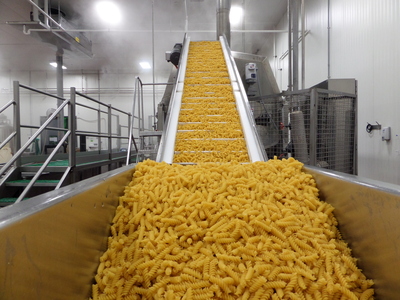Faster pasta for supermarket chain
Roundy’s supermarkets is a well-known group of 160 retail stores and 88 pharmacies throughout Wisconsin, Minnesota and Illinois, with annual sales topping US$4 billion.
Since 2007, Roundy’s has relied on a chain-driven, semicontinuous conveyor batch process system for cooking and cooling its pasta and potatoes for fresh soup and salad products.
Unfortunately, these systems have many drawbacks. “With our potatoes, the wedges and slices did not cook well,” said Mario Jedwabnik, Vice President Manufactured Foods at Roundy’s. “They would stack up, and the steam penetration was insufficient to cook through the layers, so some potatoes were undercooked. Cooling them down was another problem. We could not get enough water on the potatoes to cool them evenly.
“But pasta was a nightmare for us. Our conveyor baskets were 40 x 91 cm, and the pasta tended to compact into them like a paste during the cooking and cooling processes. There was not enough circulation of water through the baskets to keep the pasta separated.”
Roundy’s was plagued with excessive downtime of around 30% due to problems like conveyor chain breaks and baskets becoming separated from the chain and jamming inside the cooking and cooling chambers. Whenever this happened, the unit needed to cool down and be taken apart, repaired, re-welded, cleaned and restarted.
Changeover times between potato cuts or pasta varieties took about 60 minutes. Changeovers from pasta to potatoes, which required cleaning the system, took 2.5 hours.
Roundy’s was processing 300 kg/h potatoes and 450 kg/h pasta, but this was not enough to keep up with demand. The company researched a number of systems that could handle its throughput needs. One was a new continuous rotary cooking and cooling design from Lyco Manufacturing.
“We visited the Lyco plant in Columbus, Wisconsin,” said Jedwabnik. “We discussed options with their engineers and subsequently tested our potato and pasta products through Lyco’s cooking and cooling equipment at their on-site test lab. The speed of processing and the quality of the finished product impressed us.”

In 2011, Roundy’s selected a Lyco Clean-Flow continuous-flow cooker and cooler system to process its potatoes and pasta. The Clean-Flow cooker was backed up by a Clean-Flow cooler, capable of moving 907 kg/h of potatoes or pasta - a 300% and 100% increase respectively compared to the company’s existing machinery.
The continuous-process cooker/cooler uses an auger to control product retention time, while a water-injection system called Hydro-Flow agitates the product and holds it in suspension through an enclosed water-filled screen.
The Roundy’s system uses two enclosed continuous Clean-Flow units - one for cooking and one for cooling. The machines have internal augers to control dwell time in a wedge wire basket. The auger flights do not drag the product through the cooker and cooler system; rather, product is carefully agitated while suspended in water as it advances through the auger and basket assembly. Damage to potatoes and fragile pasta products is less than 1%, Lyco says.
The cooler runs at 10-15°C, which stops the potatoes or pasta from further cooking. This improves the product consistency and gives a better quality product than what Roundy’s had with its previous conveyor batch process system. Clean-up time was reduced from 2.5 hours to 45 minutes, as the auger is completely exposed for cleaning.
By early 2012, Roundy’s experienced a dramatic increase in demand, exceeding capacity of its 12-month-old cooker/cooler system. “We went back to Lyco’s engineering team to re-evaluate our needs,” Jedwabnik said.
“We emerged with an upgraded Clean-Flow system capable of processing 1360 kg/h potatoes per hour and 1580 kg/h pasta, which is significantly more than our previous system.”
In fact, the new system can process more than 400% more potatoes and more than 300% more pasta per hour than Roundy’s’ original conveyor batch system, with virtually zero product defect and near-zero downtime from malfunction.
“Aside from the sizeable increase in throughput volume, the product coming out of the new Clean-Flow cooker/cooler is consistent,” Jedwabnik said. “We are very pleased with the system’s performance.”
Kokumi chemistry for rich-tasting sparkling wines
Kokumi compounds can bring a richness of flavour to foods like cheese, but now scientists have...
From cream to clean: ice cream maker implements organic wastewater solution
An ice cream manufacturer transitioned from traditional aluminium-based coagulants to a...
Maximising yield and minimising waste in dairy processing
Rockwell Automation Model Predictive Control technology is designed to optimise dairy processes...











